Akai MPC One
$463.99
Make music production a breeze with the Akai MPC One, the ultimate portable beat making machine.
Compare
Description
As technology has advanced in recent years, the world of music production has been transformed. One of the most popular instruments for producing electronic music is the MIDI controller, which allows musicians to control software-based synthesizers and sound modules from their computer systems. The Akai MPC One Synthesizer is a notable example of a MIDI controller that has been designed specifically for electronic music production.
What is the Akai MPC One Synthesizer?
The Akai MPC One is a standalone synthesizer that combines powerful hardware and software to provide musicians with an intuitive and flexible music production platform. The device features a 7-inch multi-touch screen, eight touch-sensitive velocity-sensitive pads, a customizable workflow, and a built-in sample library. The device can also be used as a MIDI controller to control external hardware and software systems.
The MPC One is powered by an ARM Cortex-A17 processor and comes with 2GB of RAM and 4GB of internal storage space. The device runs on AKAI’s proprietary operating system, which allows musicians to browse and load sounds, edit sequences, and control effects in real-time. The MPC One also has a variety of ports, including MIDI, USB, and SD card slots, that make it easy to connect to other devices and expand its capabilities.
Key Features of the Akai MPC One Synthesizer
The MPC One is designed to provide musicians with a powerful and flexible music production platform that can be adapted to their specific needs. Here are some of the key features that make this device stand out:
1. Built-in Libraries: The MPC One comes with 2GB of pre-installed content, including a variety of sound samples, loops, and instruments. This library can be accessed directly from the device and can be used to create complex arrangements and patterns.
2. Integrated Sequencer: The MPC One’s sequencer is one of its most powerful features, allowing musicians to create and edit complex patterns and sequences. The device also supports real-time recording, overdubbing, and quantization to help musicians stay in sync with the beat.
3. Customizable Workflow: The MPC One is highly configurable, allowing musicians to set up their preferred workflow and control scheme. The device also supports multiple tracks, scenes, and projects, giving musicians the flexibility to create and arrange their music in a variety of ways.
4. Flexible Connectivity: The MPC One supports a wide range of connectivity options, including MIDI, USB, and SD cards. This makes it easy to connect to other devices, controllers, and sound modules, and to expand the device’s capabilities over time.
5. Touchscreen Interface: The device’s 7-inch touchscreen provides musicians with an intuitive and visual interface that makes it easy to navigate menus and settings. The screen also allows for precise and detailed control over the device’s features and functions.
Who is the Akai MPC One Synthesizer for?
The Akai MPC One Synthesizer is ideal for musicians who are looking for a powerful and flexible music production platform that can be adapted to their specific needs. The device is suitable for a wide range of genres, including electronic music, hip-hop, and pop. The MPC One is also ideal for musicians who prefer a hardware-based workflow and who want to be able to create and edit music on the go.
Conclusion
The Akai MPC One Synthesizer is a powerful and flexible music production platform that offers musicians a range of creative possibilities. The device’s built-in libraries, integrated sequencer, customizable workflow, and flexible connectivity make it a great choice for musicians who want to take control of their music production. Whether you’re a beginner or an experienced musician, the MPC One is a versatile and user-friendly tool that can help you take your music to the next level.
Akai MPC One properties
| Product name |
MPC One |
| Brand |
Akai |
| Type |
Keyboard Instruments |
| Keyboard Instrument |
Synthesizer |
| Keys |
Yes |
| Number of Keys |
16 pcs |
| Pads |
Yes |
| Rotary Controls |
Yes |
| Connections |
3.5mm (Aux), 6.3mm (1/4″RTS), 6.3mm (1/4″RTS) In, MIDI, MIDI In, Memory Card, USB |
| Colour |
Black |
| Power Supply |
Electrical Cable to Wall Socket |
Frequently Asked Questions:
How do I optimize the sampling workflow on the Akai MPC One for maximum efficiency and creativity?
Familiarize yourself with the hardware and software: Before diving into the sampling workflow, it's essential to have a thorough understanding of the Akai MPC One's interface, functions, and features. Spend some time exploring the menus, buttons, and screens to become comfortable with the device. Plan your sessions: To make the most out of your sampling workflow, plan your sessions ahead of time. Decide on the sounds you want to sample, the sequences you want to create, and the style or genre you're working in. This will help you stay organized, focused, and efficient throughout the session. Use a good audio interface: The Akai MPC One has built-in audio inputs, but for best results, it's recommended to use an external audio interface. This will provide better signal quality, lower latency, and more flexibility in routing your audio sources. Label your samples: As you sample sounds, make sure to label them with descriptive names that accurately reflect their content. This will help you find them quickly when you're ready to use them in your sequences. Organize your samples: To keep your sampling workflow efficient and organized, create folders or banks for your samples based on their category or function. For example, you might have a folder for drum samples, another for bass samples, and so on. Use MIDI to trigger your samples: Instead of relying solely on the Akai MPC One's pads, consider using MIDI to trigger your samples. This will give you more flexibility in terms of velocity, timing, and expression, as well as allowing you to use external MIDI controllers if desired. Use automation: The Akai MPC One supports automation for a wide range of parameters, from volume and panning to effects settings and sequencing functions. Take advantage of this feature to add variety, dynamics, and interest to your sequences. Collaborate with others: The Akai MPC One supports multi-track recording and playback, as well as importing and exporting audio files in various formats. Use these features to collaborate with other musicians or producers, either remotely or in the same room. Practice good sampling etiquette: Remember to always obtain proper clearance for any samples you use, whether they're free or paid. And be sure to give credit where it's due by properly attributing your sources and avoiding any misleading or deceptive practices. By following these tips, you should be able to optimize the sampling workflow on the Akai MPC One for maximum efficiency and creativity.
How can I efficiently program and sequence complex rhythms using the MPC Live's advanced sequencing features and MIDI functionality on an Akai MPC One?
Familiarize yourself with the MPC Live's sequencing capabilities by reading the user manual and watching tutorial videos online. Get to know the different modes, such as Step Sequence, Real Time Recording, and Quantize. Start by creating a new session or opening an existing one. Choose the pad bank that you want to work with (either the 16-pad or the 96-pad version). Select the desired sound or instrument from your sample library and load it into the MPC Live's memory. You can do this by either dragging and dropping the file onto the corresponding pad or using the browser to locate the sample. Set up your MIDI controller (if you have one) by connecting it to the Akai MPC One via USB or MIDI DIN. Make sure that the controller is properly recognized by the device by checking the MIDI settings in the MPC Live's menu. Decide on the rhythm and tempo you want to create, and set them up using the Tap Tempo feature or the internal metronome. You can also adjust the swing and groove parameters to achieve a more natural feel. Begin programming your rhythm by navigating to the Step Sequence mode. Use the pads to input notes, rests, and other rhythmic elements, and adjust their velocity and duration using the Quantize feature if necessary. You can also use the MPC Live's arpeggiator or pattern quantization tools for added complexity. Switch over to Real Time Recording mode to capture live performances and improvisations. This allows you to record your actions as you play them, rather than inputting them manually. Use the MIDI functionality on the Akai MPC One to incorporate external hardware and software into your rhythmic sequences. You can connect synthesizers, drum machines, and other devices via MIDI DIN or USB, and use the MPC Live's MIDI routing feature to control them from within the sequencer. Finally, refine your rhythm by adjusting parameters such as velocity, pitch bend, and release time. You can also use the undo and redo functions to make corrections as needed. Save your sequence and export it in the desired format (such as WAV or MIDI) for further editing or integration into other projects. Continuously practice and experiment with different rhythms and techniques, incorporating elements of polyrhythm, syncopation, and other advanced concepts. Lastly, always strive to perform the task to the best of your ability, whether it's creating a simple beat for a demo or composing an intricate groove for a live performance.
What unique features does the Akai MPC One offer for advanced production workflows?
The Akai MPC One is a powerful production tool that offers several unique features for advanced workflows. Here are some of them:
1. Comprehensive Software Bundle: The MPC One comes with a comprehensive software bundle, including MPC Beats, MPC Essentials, and Virtual DJ LE. These applications offer advanced sequencing, production, and performance capabilities that enable users to create professional-grade tracks quickly and easily. RGB Velocity Sensitive Pads: The MPC One features 16 large-format RGB backlit pads that provide tactile feedback for each velocity level. This feature is particularly useful for precise and dynamic drum programming, as well as for creating complex MIDI sequences. Built-in MIDI Interface: The MPC One has a built-in MIDI interface that allows users to connect external MIDI devices such as synths, samplers, and drum machines directly to the unit without the need for additional hardware. This feature is particularly useful for live performances where multiple instruments are involved. Real-Time Audio Warping: The MPC One features real-time audio warping capabilities that enable users to sync external audio sources to the host project's tempo. This feature is particularly useful for working with samples and loops from various sources, as it ensures that they all remain in sync with the main project's tempo. Advanced Time Correction: The MPC One offers advanced time correction tools that allow users to correct timing issues in their tracks automatically. These tools include swing, shuffle, and quantize functions that ensure that each note falls into place seamlessly. Automation and Macros: The MPC One provides automation and macro capabilities that enable users to create complex workflows and sequences with ease. Users can assign multiple parameters to a single knob or button and then map them to different events, creating complex sequencing patterns in seconds. In summary, the Akai MPC One offers a wide range of advanced production features that cater to professional-grade workflows. Its comprehensive software bundle, large-format pads, built-in MIDI interface, real-time audio warping, time correction tools, and automation/macro capabilities make it an excellent choice for advanced music producers and performers alike.
How can I optimize the performance capabilities of the Akai MPC One through advanced programming techniques and software updates?
To optimize the performance capabilities of the Akai MPC One through advanced programming techniques and software updates, you can follow these steps:
1. Familiarize yourself with the MPC One's features and functions by reading the manual or watching tutorial videos online. This will help you understand how to use the device to its fullest potential. Use the built-in sequencer to create your own beats, melodies, and arrangements. You can also import your own samples and loops into the MPC One using a USB drive or Wi-Fi connection. Take advantage of the device's 16 velocity and pressure-sensitive pads to add nuance and expression to your performances. You can also use the Q-Link controllers to manipulate various parameters in real time. Utilize the MPC One's advanced programming techniques, such as slicing, warping, and shuffling, to transform samples into unique and dynamic compositions. Stay up-to-date with software updates for the MPC One. Akai regularly releases firmware updates that add new features and bug fixes. You can download these updates from the Akai website or directly on the device via Wi-Fi. Consider investing in expansion modules, such as the MPC Expansion Card or a USB audio interface, to expand the MPC One's functionality and connectivity options. Experiment with different workflow techniques, such as using the MPC One as a standalone device or integrating it into a larger digital audio workstation (DAW) setup. This can help you find the most efficient and enjoyable way to use the device for your specific needs. Remember, the key to optimizing the performance capabilities of the Akai MPC One is to constantly learn new techniques and experiment with different approaches. By pushing yourself to try new things and stay updated on the latest software releases, you can unlock the full potential of this powerful production tool.
What are the key differences between the Akai MPC One's internal Sample RAM and its external SD card storage options, and how do these impact workflow efficiency and project planning?
**Internal Sample RAM:**
* The MPC One has 2GB of internal sample RAM, which can store up to 128 samples. This internal memory is dedicated solely to storing samples, making it faster access for the MPC's processors. The internal RAM is ideal for working with a small number of high-quality samples or for creating drum patterns and beats. External SD Card Storage:**
* The MPC One has an SD card slot that supports up to 2TB of external storage. This external storage can be used to store additional samples, projects, and even third-party plugins. External storage is ideal for working with large sample libraries or for storing multiple project files. Workflow Efficiency:**
* The internal sample RAM provides faster access times for the MPC's processors, making it ideal for real-time sampling and editing. The external SD card storage offers more flexibility in terms of storage capacity and can be easily swapped out when working on different projects. The combination of both internal and external storage options allows producers to work seamlessly with a large library of samples while still having access to high-quality, low-latency sample playback. Project Planning:**
* The MPC One's internal sample RAM is limited to 128 samples, making it ideal for working on smaller projects or for creating drum patterns and beats. The external SD card storage allows producers to work with larger project files and store multiple projects simultaneously. Producers can use the internal RAM for high-priority samples and reserve the external storage for less frequently used samples. Overall, the combination of both internal sample RAM and external SD card storage options on the Akai MPC One provides a powerful and flexible workflow solution for music producers. By understanding the key differences between these two storage options, producers can optimize their workflow efficiency and project planning to achieve their creative goals.
Before you buy Akai MPC One
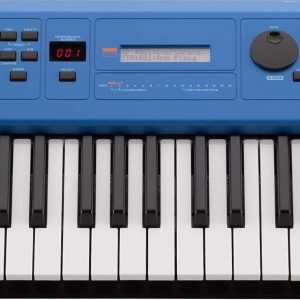 Yamaha MX49 II
Yamaha MX49 II 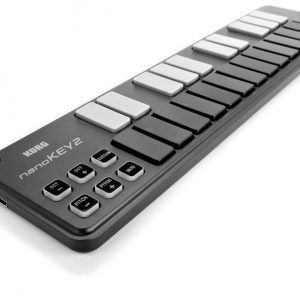 Korg nanoKey 2
Korg nanoKey 2 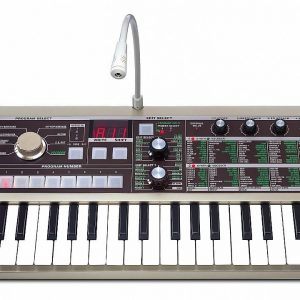 Korg microKORG
Korg microKORG 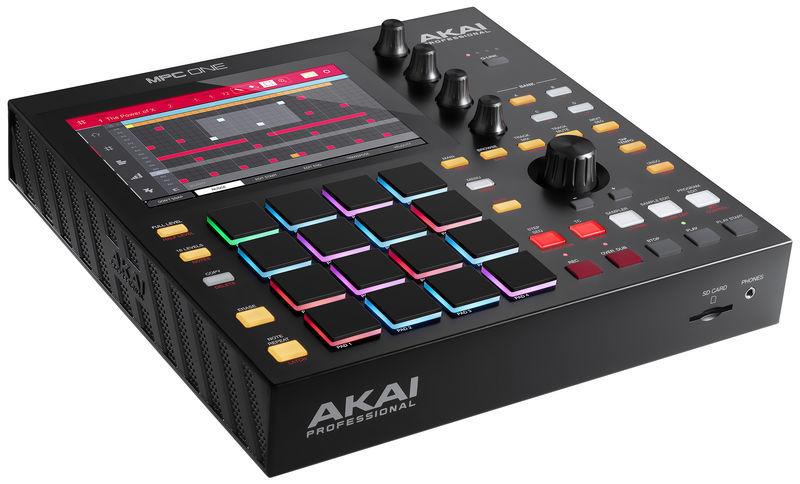



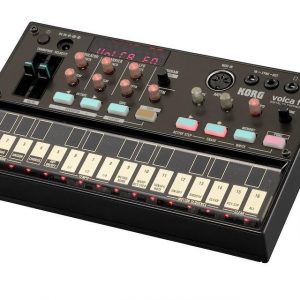
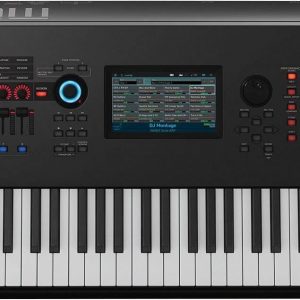
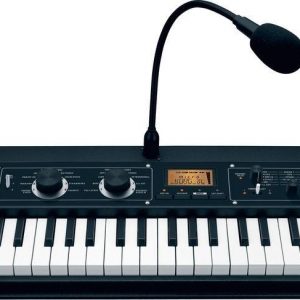
Voit –
I use many different devices every day – Digitakt, computer with Ableton, iPhone with Garageband, classic MPC and a lot of other devices.
It is only about MPC One that I can say that it is the center of my studio, if I play with DAW-less.
Such a seemingly simple thing – midi live looping with many instruments. In Digitact, setting everything up so that it sends NOTE OFF signals well, so that nothing overlaps and that it is straightforward to go to the paths took me a lot of time. It wasn’t perfect anyway.
I took them, everything went right on the spot.
Additionally, One has a USB Host. No more fun with MIDI cables, you just connect what you can to the USB hub, and the hub to MPC and elo.
However, the touchscreen is a game-changer.
If you are considering between MPC One and other equipment (e.g. between Digitakt), think about what you want to use this equipment for.
For me to be the heart of music in the studio, if we want to move away from the computer, the equipment is perfect. If I go the other way and play with samples while creating lofi shitsongi, the MPC has no equal. For my application, Digitakt has not worked. Seemingly fewer features did not make me have what I wanted right away.
If this hardware only had a rotating screen, it would be really perfect for me.
Eden –
As a cashier living in Raleigh, I recently purchased the Akai MPC One synthesizer in February. While I was initially excited about this purchase, I have mixed feelings about it now.
One of the drawbacks of the Akai MPC One is that there are no pre-programmed rhythms available. This can be frustrating for beginners who are not familiar with the ins and outs of synthesizers. However, once you get the hang of it, you can create your own rhythms easily.
One thing that stands out about the Akai brand is their reputation for quality products. While the MPC One is not the best synthesizer on the market, it is still a solid choice for live performances or studio recordings.
Comparing it to other synthesizers I have used, such as the Korg Minilogue, I find the Akai MPC One to be more complex in terms of programming. However, if you take the time to learn the ins and outs of the synthesizer, the results can be impressive.
The delivery of the Akai MPC One to Raleigh was quick and hassle-free. The packaging was secure, and the synthesizer arrived in perfect condition. Overall, I rate the Akai MPC One synthesizer 3 out of 5 stars due to its lack of pre-programmed rhythms, but still, find it to be a reliable and high-quality product from the Akai brand.